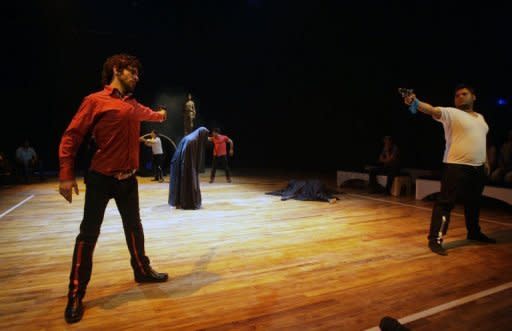Shakespeare tragedy set amid Iraq strife
Romeo is Shiite, Juliet Sunni, and they must contend not only with warring families but a country torn by conflict and sectarian strife: this is the story of "Romeo and Juliet in Baghdad". Pistols have replaced swords and some characters wear traditional dishdashas, abayas and keffiyah scarves, but the changes go far beyond props and costumes. The play is a distinctly Iraqi take on William Shakespeare's 16th-century classic -- it is in the Iraqi dialect of Arabic, with an Iraqi cast and an Iraqi director who also adapted the play, weaving in the conflict and suffering with which Iraqis have had to live for the past nine years and more. One of the final scenes combines the general horror of suicide bombings in Iraq with a reference to a specific attack on October 31, 2010, in which militants killed 44 worshippers and two priests in Our Lady of Salvation church in Baghdad. Romeo flees to the church after killing the hot-headed Tybalt, and is later joined there by Juliet. In the play's biggest departure from Shakespeare's original story, Juliet's spurned suitor Paris enters the church wearing a belt of explosives and blows himself up, killing Romeo and Juliet. Monadhil Daood, 52, who adapted and directed the play, said that Paris is a member of Al-Qaeda and is not an Iraqi -- a reference to foreign fighters who came to Iraq after the 2003 US-led invasion. The reality of Iraq, and especially the sectarian violence here, ultimately provides a more tragic setting for the story of the two star-crossed lovers than Verona, Italy, where the original "Romeo and Juliet" was set. In 2006, militants bombed the Shiite Al-Askari shrine in Samarra, unleashing a sectarian war of bombings and death squad murders that killed tens of thousands of Iraqis and forced many more from their homes. That violence was eventually brought under control, but attacks remain common even today, and many Iraqis face other problems such as severe deficiencies in basic services such as electricity and water. It is the reality of life here, which they have experienced first-hand, that the play's leading actors want to convey. "Romeo and Juliet in Baghdad is (about) an Iraqi problem, 100 percent, so Romeo will suffer Iraqi sufferings," said Ahmed Salah Moneka, 23, who plays Romeo. "Now," he said, "it is an Iraqi story." "I want to convey messages of the suffering of this generation and previous generations, and the suffering of love," Moneka said. "There are two sects in Iraq and it has happened many times that two people from those two sects love each other and they cannot continue" their relationship, said Sarwa Rasool, 23, who plays Juliet, adding that this not only goes for Sunnis and Shiites, but also Arabs and Kurds. Anyone "who has a goal must not put sectarianism in front of (that) goal, or this tribe or that, or any other matters that stop love," she said. Both Moneka and Rasool have had personal experience with sectarian tragedy. "My friend committed suicide because her lover was Arab and she was Kurdish and her family did not accept him," said Rasool, who is herself Kurdish. And the Urr neigbourhood in north Baghdad where she lives was hit by sectarian violence. "During the time of Saddam's regime, my area was mostly Sunni, but after its collapse it became mostly Shiite, and they started killing each other," she said. There was an old man who owned a shop in her neighbourhood, which she could see from her home. "Because he was from the other sect (Sunni), he was killed by the Mahdi Army," she said, referring to Shiite cleric Moqtada al-Sadr's militia. "They came and killed him in front of my eyes; this is a simple example of what we witness." "Our generation grew up in a war and lived its childhood during a war and embargo," Moneka said. "I have friends who were injured in explosions, and I lost two of my friends during the sectarianism," he said. "That made my performance stronger and deeper and more serious." The play, which opened to a packed house at Iraq's National Theatre on April 16, was commissioned for the World Shakespeare Festival, part of the cultural programme for the London 2012 Olympics. It will show in Stratford-upon-Avon from April 26 to May 5, and in London from June 28 to 30. But it is ultimately a play tailor-made for Iraqis, and its director Daood said that it should be performed in Iraq again after its run in England. "I think it's a play that speaks directly to the Iraqi people first; it was written for Iraqis -- it wasn't written for an international festival circuit," said Deborah Shaw, who commissioned the play. "I need to help my people," said Daood. "I need to tell them, come and see yourself, because I am the mirror."




